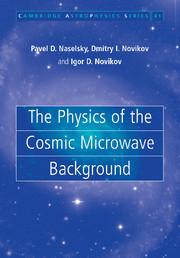Book contents
- Frontmatter
- Contents
- Preface to the Russian edition
- Preface to the English edition
- 1 Observational foundations of modern cosmology
- 2 Kinetics of electromagnetic radiation in a uniform Universe
- 3 The ionization history of the Universe
- 4 Primordial CMB and small perturbations of uniform cosmological model
- 5 Primary anisotropy of the cosmic microwave background
- 6 Primordial polarization of the cosmic microwave background
- 7 Statistical properties of random fields of anisotropy and polarization in the CMB
- 8 The Wilkinson Microwave Anisotropy Probe (WMAP)
- 9 The ‘Planckian era’ in the study of anisotropy and polarization of the CMB
- 10 Conclusion
- References
- Index
Preface to the Russian edition
Published online by Cambridge University Press: 18 August 2009
- Frontmatter
- Contents
- Preface to the Russian edition
- Preface to the English edition
- 1 Observational foundations of modern cosmology
- 2 Kinetics of electromagnetic radiation in a uniform Universe
- 3 The ionization history of the Universe
- 4 Primordial CMB and small perturbations of uniform cosmological model
- 5 Primary anisotropy of the cosmic microwave background
- 6 Primordial polarization of the cosmic microwave background
- 7 Statistical properties of random fields of anisotropy and polarization in the CMB
- 8 The Wilkinson Microwave Anisotropy Probe (WMAP)
- 9 The ‘Planckian era’ in the study of anisotropy and polarization of the CMB
- 10 Conclusion
- References
- Index
Summary
We wrote this book in 2001–2002. These years saw the launch and start of operations of the American satellite WMAP (Wilkinson Microwave Anisotropy Probe), which began a new stage in the study of the primordial electromagnetic radiation in the Universe. This stage brought a qualitative change to the status of modern cosmology which, using a metaphor suggested by Malcolm Longair, entered the phase of ‘precision cosmology’ in which the level of progress in theory and experiment was so high that the interpretation of observational data became relatively less urgent than the problem of measuring the most important parameters that characterize the state of gravitation and matter as they were long before the current phase of the cosmological expansion.
Paradoxically, the entire period of explosive development of cosmology happened virtually within the last three decades of the twentieth century; however, it brought together thousands of years of mankind's attempts to comprehend the basic laws governing the structure and evolution of the Universe. Regarded formally, this period coincided – although realistically it was genetically connected – on one hand with the penetration into the mysteries of structure of matter at the microscopic level and on the other hand with the sending of humans into space and with progress in space technologies that revolutionized the experimental basis of the observational astrophysics.
- Type
- Chapter
- Information
- The Physics of the Cosmic Microwave Background , pp. xi - xivPublisher: Cambridge University PressPrint publication year: 2006

